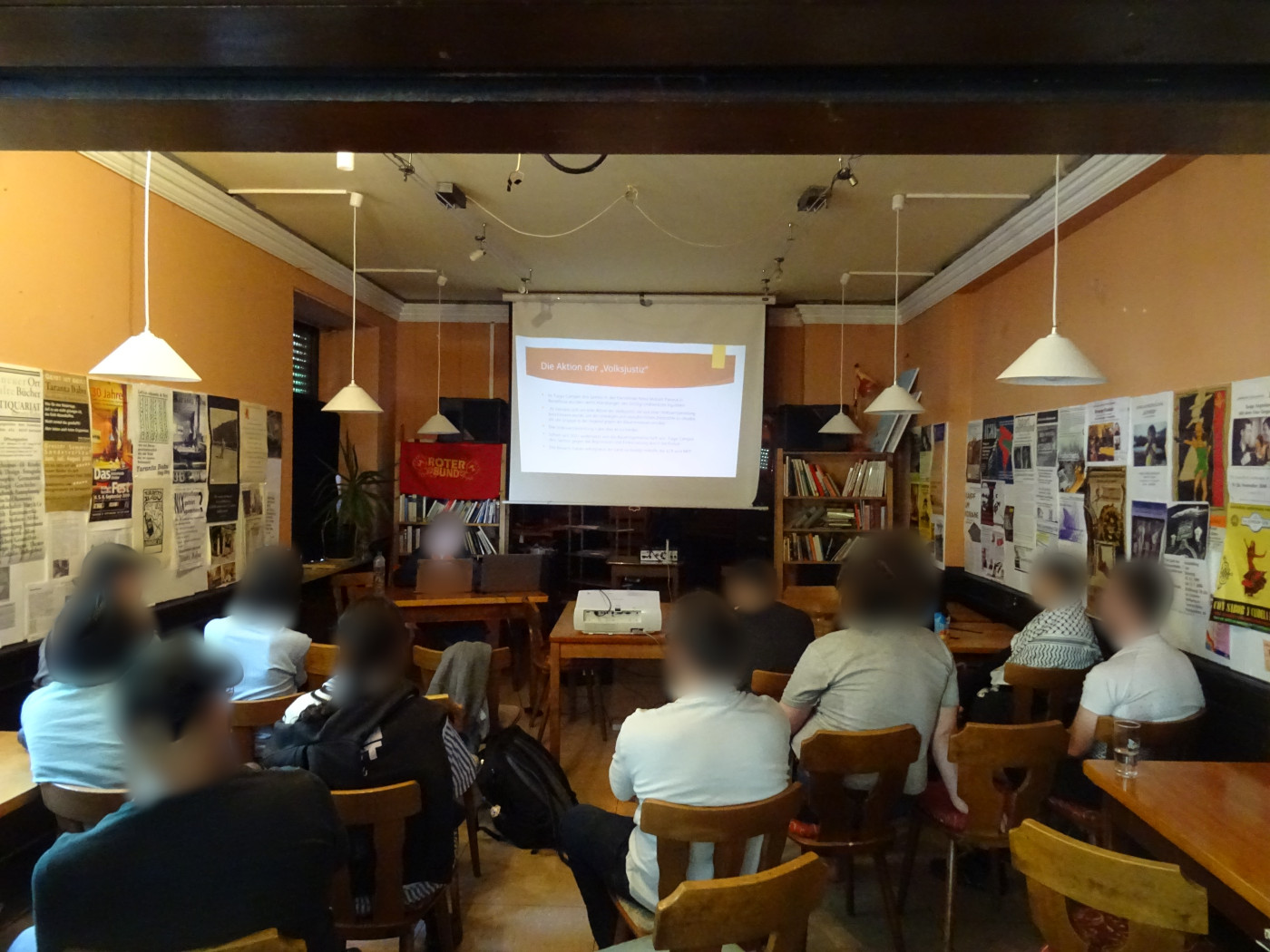LAS
CONTRADICCIONES INTER-IMPERIALISTAS SON HECHOS OBJETIVOS
DETERMINADOS POR LA NATURALEZA DEL SISTEMA IMPERIALISTA MUNDIAL
……..
……..
2.1
……..
……..
2.2
2.2
LA POLÍTICA INTERNACIONAL DEL PRIMER GOBIERNO DEL ULTRA-REACCIONARIO
TRUMP
INTRODUCCIÓN:
Necesitamos
aplicar la teoría para entender la situación actual para
transformar el mundo. Por eso, citamos parte de la intervención del
Presidente Gonzalo en el Primer Congreso del Partido Comunista del
Perú (1988), cuando el fundamenta la definición del Maoísmo como
tercera, nueva y superior etapa de la ideología del proletariado, él
dice:
"
(...) las relaciones económicas y políticas que están
desenvolviéndose por el proceso de descomposición del
imperialismo”.
Muy
importante. Uno de los problemas que hemos tenido es cómo definir
este momento, este período en el cual nos desenvolvemos. ¿Dónde
hemos encontrado la cuestión?, en el propio Presidente Mao
-descomposición del imperialismo es mayor cada día-, con sus
propias posiciones, él plantea eso.
¿Quién
puede negar la descomposición mayor cada día del imperialismo, no
se está hundiendo más y más?, se está descomponiendo, se está
pudriendo; si algunos pueden invocar que producen más, ¿y qué
diablos importa, ése es el problema?; al contrario, si más
producen, lo que está haciendo ver es que hay todos los medios para
satisfacer las necesidades elementales. Ya en la segunda guerra, ¿qué
se decía al término de la misma?, bastaría trabajar cuatro horas y
se podría satisfacer todas las necesidades fundamentales de la
humanidad. Pues bien, el salto que se ha dado del 50 al 75 ha
duplicado la producción del 900 al 50 y la producción del 900 al 50
es igual a toda la de la humanidad desde sus comienzos, ¿se
imaginan?, eso nos está demostrando que los tiempos de la
expropiación de los explotadores se acerca y que van a ser
destruidos, por eso es que están en descomposición.
Algunos
dicen Lenin se equivocó porque vemos que tienen más cohetes, más
armas, ¿pero eso no es expresión de debilidad en todo el mundo?, en
toda la historia siempre ha sido expresión de debilidad. Lo que
dice el marxismo es que el imperialismo frena toda la capacidad que
tienen los medios de producción existente, no dice que no produzcan;
eso es lo que nunca Hoxha entendió en su perra vida; han confundido
y algunos repiten, no entienden el problema, creo que eso es. Eso es
descomposición del imperialismo y su artillamiento mayor cada vez,
signo de debilidad y no de fortaleza; révIsese cualquier historia o
véase la historia a fondo y se entenderá, cualquier historia
militar lo demuestra.
Peso
de la masa, naciones oprimidas, descomposición del
imperialismo, ¿a dónde lleva todo esto?: tres mundos se
delinean. Sí, tesis del Presidente Mao Tsetung; no tiene nada
que ver con la teoría podrida, revisionista de los tres mundos de
Teng que es otra cosa porque ese es un frente para servir al
imperialismo o ponerse de· lado de las superpotencias· o para
querer ser potencia a su vez como está soñando ya. ¿Para qué
quiere armarse hasta los dientes, por qué quiere ser potencia
militar?, ya se ve, ¡el mismo camino!, no pudiéndose desenvolver y
potenciar la fuerza económica porque están restaurando más y más
el capitalismo ahora quieren usar la inmensa masa, de más de mil
millones de hombres como carne de cañón, quieren utilizarla
potenciando el poderío militar para ser potencia y pelear por el
dominio del mundo, también maquinando como otros como Alemania, como
Japón, que del choque de las dos superpotencias debe devenir otra
potencia u otra superpotencia dominante; ¿no era ese el sueño
bastardo de Japón nefasto de los años 30, no es el negro sueño de
Alemania, no es el negro sueño de Teng?, claro pues camaradas; así
que no tiene que ver.
Y
no es un problema de táctica, incluso llega a decir Avakian
"yo creo que es una situación de un uso de la táctica",
me parece una estupidez. Es una estrategia, es una comprensión
global de dónde está el peso de la masa en la tierra, es el
problema de las relaciones que hay entre imperialismo y naciones
oprimidas, ese es el problema, es el problema que solamente puede
comprenderse la situación internacional actual partiendo de las
relaciones económicas internacionales del imperialismo, esa es la
tesis de Lenin. Pero –él cuando plantea y dice ¿cuál es la
esencia de mi posición? es que hay naciones opresoras, o él dice:
"pueblos opresores, pueblos oprimidos" bueno a algunos no
les gusta que sea pueblos, vayan a discutir con Lenin pues camaradas,
él ha puesto así, él lo puso así- pero luego él mismo lo
específica y ya ha quedado como imperialistas y naciones oprimidas.
También
me parece que sería error decir Lenin se equivocó, ¿por qué,
sabemos que quiso decir?; yo creo que muchas cosas camaradas, en
Marx, en Lenin, en el Presidente no las entendemos creo, uno debe ser
sincero, cada vez que uno vuelve y agarra un texto de cualquiera de
esos grandes, encuentra cosas nuevas, ¿o no es así?, me parece una
vanidad estúpida creer que todo ya entendemos; yo me digo
¿entendemos todo lo que ha dicho Lenin?, yo no creo; ¿todo lo que
ha dicho el Presidente?, no creo camaradas; me parece que no hay que
tener soberbia bastarda, son soberbias de caballos voladores, de
gentes que creen que el genio viene del cielo; muchas cosas tenemos
que entender, muchas cosas hay por comprender.
Nos
parece que el Presidente con esto está poniendo entonces bases
para desarrollar la estrategia y la táctica y esto es
necesario, obviamente. Pero ahí tenemos un problema, ¿acaso
conocemos todo lo que el Presidente ha dicho, todos sus escritos,
podrían ventilarse y publicarse los debates del Presidente sobre
cómo concebir y hacer la revolución, podría pregonarlo, creen
ustedes que podría?, eso es pues secreto camaradas, ¿cómo va a
plantear?; lo que podría plantear son los criterios políticos de
orientación, otros debates tienen que quedar un tiempo
reservados, me parece que eso es elemental de comprender. Por lo
demás, ¿hay testigos?, yo creo que hay y existen porque hay una
cita del Presidente con japoneses donde les dice: “Hay un primer
mundo que es Estados Unidos y la Unión Soviética, hay un segundo
mundo, Japón por ejemplo y hay un tercero donde está China” (…)"
A
partir de diciembre de 1991, cuando se produce la bancarrota
definitiva del revisionismo soviético y la URSS queda reducida a lo
que es hoy Rusia, el primer mundo entra en re-definición. Rusia
desde allí se mantiene como superpotencia atómica y el imperialismo
yanqui llega a ser la superpotencia hegemónica única.
El
imperialismo yanqui, como la superpotencia imperialista hegemónica
única, busca ampliar su soberanía aplicando sus leyes allende sus
fronteras en prosecución de su objetivo de controlar el mundo
entero.
Las
diferentes administraciones de EEUU, desde 2009 principalmente, han
tratado de velar la naturaleza de la contradicción con sus aliados y
rivales imperialistas, como si fuere solo como un problema de
comercio mundial y de seguridad con la China socialimperialista y con
las otras potencias rivales y “aliadas” como problema de
intercambio comerciales justos. Aquí, tratamos el desarrollo de esta
contradicción sobre todo en el primer gobierno de Trump (2017-2021),
pero con obligada referencia a los gobiernos anteriores.
A
continuación, presentamos algunos hecho y datos en base a citas de
estudios o documentos de institutos imperialistas y de autores
burgueses, que muestran la situación de conjunto a finales de la
primera administración de Trump.
LA
POLÍTICA INTERNACIONAL QUE GUIABA A ESTE GOBIERNO FUE LA
CONTINUACIÓN DE LA APLICADA POR OBAMA
Advertimos
a nuestros lectores, que la política internacional que guiaba a este
gobierno, en sus lineas fundamentales fue la continuación de la
aplicada por Obama, sobre todo, desde 2012. Además, la naturaleza de
las contradicciones de que tratamos en esta parte, como no han
cambiado de naturaleza, sino solo de profundidad y alcance, sirve
para ver la realidad actual y el carácter de las medidas del segundo
gobierno de Trump.
El
instituto alemán de Asuntos Internacionales y de Seguridad, en un
estudio publicado en 2019 y luego en 2020, partiendo de los intereses
del imperialismo alemán, ve la contienda chino-norteamericana y sus
implicancias para los otros países imperialistas en el tiempo del
primer gobierno de Trump, así:
“La
narrativa de una gran competencia de potencias, propagada por la
administración Trump, debe analizarse en el contexto de este debate
y la expectativa de que una potencia en ascenso inevitablemente
desafiará el orden internacional existente”.
Nota:
sobre esto trataremos en una entregar específica que haremos
siguiendo la tesis de Lenin “sobre los imperialismos nuevo y
viejos”.
Prosiguiendo:
“Washington considera a China una potencia revisionista que aspira
a la hegemonía regional en el Indo-pacífico y, a largo plazo, a la
supremacía global. Pekín niega tales aspiraciones, pero alimenta
esta percepción estadounidense con una política exterior más
asertiva.
La
administración Trump ha adoptado un enfoque ofensivo ante la
competencia de poder y el conflicto ideológico con China, rompiendo
con la política anterior de Estados Unidos hacia China de compromiso
político y económico, respaldado por la cobertura militar y la
disuasión. Su nuevo enfoque de confrontación cuenta con un amplio
apoyo; actualmente existen pocos incentivos políticos para adoptar
una actitud más relajada ante las amenazas económicas y de
seguridad que plantea China. La competencia global con China parece
convertirse en el nuevo principio rector de la política exterior
estadounidense” ( Peter Rudolf, The Sino-American World Conflict,
Stiftung Wissenschaft und Politik, German Institute for International
and Security Affairs, SWP Research Paper (RP) 3, February 2020,
Berlin).
El
estudio en la parte arriba
citada
sostiene, que el
gobierno de Trump
tiene
un “nuevo enfoque de confrontación”; pensamos,
que
el SWP
presenta así las cosas, por los intereses particulares que el
defiende,
que no son solo de Alemania, sino también
de la facción del imperialismo alemán que se siente más cercana de
su similar yanqui (el PD) y que tiene como su peor enemiga a la
facción que representa Trump. De
esta forma,
se trata de hacer
ver
el desarrollo
de
la contradicción entre los EEUU y
la China
socalimperialista y de paso también
el desarrollo de
la contradicción EEUU- Alemania
como si fuera más
un
asunto de personalidades o de un gobierno determinado. Olvida a
propósito, que es con
Obama
mediante la “estrategia de Seguridad Nacional de los EEUU (2012)”,
que el Indo-pacífico pasa oficialmente a ser el centro del “enfoque
ofensivo” del imperialismo yanqui: Asia como “pivot” de su
política de seguridad.
Lo
anterior en
cuanto a China, y en cuanto a Alemania, hay que tener presente que
desde 1996 los EEUU usa las sanciones contra terceros para someter a
los países de la Unión Europea (EU), esto es principalmente en
perjuicio de Alemania. Recordemos que en 1996 la UE aprobó un
reglamento “contra los efectos de tercer país de las sanciones de
EEUU contra Cuba, Irán y Libia”. En
2017 el
presidente
del Consejo
de la UE Donald Tusk y luego la Comisión Europea anunciaron
su
reactivación
ante
la nueva ronda de sanciones impuesta por el gobierno de Trump.
Recordemos,
él
denunció
unilateralmente el acuerdo sobre el programa nuclear Iraní, sin una
justificación adecuada y
sin tomar en consideración a las otras potencias participantes,
pese a que “Irán
, después de todo, es
fiel a la letra en
su cumplimiento”-según
los otros países participantes: Alemania, China, Rusia, Francia y el
Reino Unido.
Antes,
el
Banco Comercial alemán (die Commerzbank) fue sancionado en 2015 con
1,5 miles de millones de dólares USA por el Ministerio de Comercio
de los EEUU por no haber acatado la prohibición de negociar con
Irán, eso antes del acuerdo con Irán, arriba
mencionado.
El
mismo año
al
BNP Paribas, se le impuso sanciones aún más fuertes por no acatar
la prohibición yanqui, con una penalidad de 9 mil millones de
dólares USA.
Los
comentarios en
aquel entonces fueron que nadie está dispuesto a hacer más
tratos bancarios con Irán para no desafiar a las autoridades de los
EEUU por la dominación de Wall Street sobre los mercados financieros
mundiales.
Crucial
es el
dominio de los EE. UU. en los mercados financieros internacionales
Henning
Klodt, Servicio Económico de Kiel 2018 | 6. es-director del Centro
de Política Económica del Instituto Kiel para la Economía Mundial,
en el Editorial: Sanciones de Irán: opciones para la Unión Europea.
escribió:
“Donald
Trump no presta mucha atención a sus aliados. Para el esfuerzo de
supremacía para
detener a Irán en el Medio Oriente, él (Trump)
prohíbe el comercio en este terreno
no solo para empresas estadounidenses, sino también para empresas
europeas. Quién no sigue las medidas de sanción, desde el 6 de
agosto de 2018 debe
contar con
fuertes multas o incluso ser
desterrado
completamente de los Estados Unidos.
La
indignación en Europa es grandiosa, comprensible (…) Sanciones
estadounidenses impuestas a empresas europeas que que
deben
participar obligatoriamente en
su propio perjuicio.
Y
los gobiernos europeos, no
sirve para nada
la
sugerencia frecuentemente escuchada de cómo pueden detener este
descarado ajetreo, que la UE debe estar a la altura de su poder
económico. Porque tal conducta no se puede ofrecer con los EE. UU. Y
se pierde desafortunadamente la realidad. Porque el tamaño del
producto social no importa aquí sucesivamente, ni siquiera la voz
política desigual de Europa. Es crucial
más
bien, el dominio de los EE. UU. en los mercados financieros
internacionales, que también
no
se puede superar con
las reformas de la UE a la Macron
(…) a la política (es
decir a los gobiernos de la UE)
no le queda otra cosa que tomar con tranquilidad las cosas que no se
pueden cambiar (…)”.
La
administración de Barack Obama implementó
medidas de contención:
restricciones de inversiones en las compañías de alta tecnología
Antes
de proseguir con el RP del SWP una cita que hace referencia al
gobierno de Obama:
“La
administración de Barack
Obama
ha implementado en todo caso un amplio conjunto de medidas
de contención,
incluidas restricciones de inversiones en las compañías de alta
tecnología y el sistema de control de exportaciones que excluye
a China del acceso a muchos de los productos de tecnología avanzada”
(GIGA Focus Asia, Disengagement
from China: United States and European Union Policies Compared,
Nummer 1 | 2023).
La
parte que
hemos
subrayado
es necesario tener en presente, porque esta medida de contención en
materia tecnológica apunta a endurecer o ampliar y profundizar su
política de control sobre las potencias imperialistas para
mantener el monopolio tecnológico, que responde a la estrategia
nacional del imperialismo yanqui de mantener no solo su supremacía
económica y tecnológica sino, principalmente, su
hegemonía
política y militar sobre las demás potencias imperialistas, en
busca de ampliar y mantener su calidad de superpotencia imperialista
hegemónica única. Más
abajo veremos
esto en la “dimensión tecnológica” (*).
La
estrategia del imperialismo
contempla
uso
del potencial político, económico y sicológico de una nación en
conjunto con sus fuerzas armadas durante los tiempos de paz y de
guerra en
beneficio de la oligarquía financiera yanqui
(1)
Continuamos
citando el estudio SWP-RP2020:
“(…)
Dado que Estados
Unidos y China
se perciben mutuamente como posibles adversarios militares, su
relación está determinada por la
dinámica del dilema de seguridad.
(…) En el Mar de China Meridional, la pretensión estadounidense de
libre acceso choca con los esfuerzos de China por establecer una zona
de seguridad y contrarrestar la capacidad de Estados Unidos para
intervenir militarmente.
(…)
Para la administración Trump,
la
creciente presencia económica y política global de China se produce
a
expensas
de Estados Unidos.
En consecuencia, Estados
Unidos utiliza
incentivos
y presiones para disuadir a otros Estados de ampliar sus relaciones
económicas con China.
Como
demuestra la campaña contra Huawei,
la
competencia global
por la influencia está estrechamente entrelazada con la
dimensión tecnológica
de la rivalidad estratégica chino-estadounidense. Se trata de la
supremacía tecnológica en la era digital.
Esta
dimensión del conflicto es tan pronunciada porque el
liderazgo tecnológico crea ventajas competitivas económicas
globales y asegura las bases para la superioridad tecnológica
militar”
(los subrayados son nuestros).
Comentario:
la cita presenta tres problemas: el militar o de seguridad, el
económico centrado en la competencia entre EEUU-China, pero subyace
la presión contra las otras potencias (control) y la competencia
tecnológica (tercer problema). Sobre esto queremos decir, en
cuanto a lo militar
es claro, una potencia socialimperialista que aumenta cada vez más
su potencia militar unida a la inmensa población que posee es la
mayor amenaza en perspectiva; pero en
lo económico,
la principal preocupación del imperialismo yanqui es que la Unión
Europea (Alemania) priorice sus relaciones económicas con China
para tratar de escapar a su dependencia de los EEUU. No olvidemos:
que la UE es la alianza imperialista dirigida por Alemania para
contender en
perspectiva
con los EEUU por
la hegemonía mundial.
Alemania,
tiene planteado usar las mercancías baratas que ofrece China para
renovar la parte de su maquinaria y equipo, que requiere una
producción de uso intensivo de mano de obra y financiada por el
Estado socialimperialista chino y, a cambio, seguir accediendo al
mercado chino para las exportación de sus capitales y mercancías,
mientras espera la mayor apertura económica del país para hacerse
de la mayor tajada de la torta en disputa con el imperialismo yanqui.
Además, la UE también utiliza incentivos y presiones económicas
contra China para que esta abra más su mercado o “liberalice su
economía”, el imperialismo yanqui tiene en la mira principalmente
el sistema financiero chino.
Entonces,
las medidas económicas del imperialismo yanqui, que se complementan
con las de seguridad, contra China cumplen el doble objetivo de
tratar de someter a la UE bajo su control y ganarle la partida, sin
abandonar sus intenciones de dividirla, y, al mismo tiempo, presionar
al socialimperialismo chino a que "liberalice" cada vez más
su economía. Son pues amenazas económicas y militares. Esto se
entiende bien, si se tiene en cuenta que EEUU y Alemania contienden
por ese gran mercado potencial, desarrollando su contradicción en
medio de colusión y pugna.
La
“dimensión tecnológica” (*)
La
“dimensión tecnológica” tiene que entenderse
dentro de lo que hemos dicho anteriormente. Además, si bien China ha
logrado grandes avances en la alta tecnología y algunos de impacto
como en la IA, está todavía bastante detrás de los EEUU y de
Japón, algunas potencias europeas como Suiza, Suecia, Alemania, etc.
como lo prueba su necesidad de capitales y tecnología de estos
países. Por lo cual, las medidas en la materia tecnológica golpean
a China en este terreno y buscan también privar a la UE de la
posibilidad de realizar inversiones y de exportar e importar bienes
en este terreno.
La
parte que citamos a continuación es importante porque tiene que ver
con lo antes comentado, además ya no solo con la lucha y control
sobre su rival China y aliados de la UE sino también sobre sus
aliados-rivales en Norte América (Canadá) y persigue establecer su
control mundial mediante el monopolio tecnológico , transcribimos:
“El
endurecimiento de los controles de exportación estadounidenses es
una parte importante de la política de Washington de negación
tecnológica. Estados Unidos probablemente intentará involucrar a
sus aliados en esta política. Washington tiene dos opciones que no
son mutuamente excluyentes, sino complementarias. Podría intentar
crear un nuevo régimen de controles multilaterales de exportación,
similar al CoCom (Comité Coordinador para los Controles
Multilaterales de Exportación), que desempeñó un papel importante
durante la Guerra Fría, o
podría desplegar las herramientas extraterritoriales de sus leyes de
control de exportaciones y sanciones.
En el caso de Irán, la administración Trump ya ha demostrado
claramente a sus aliados su eficacia” (SWP Research Papers, El
conflicto mundial chino-estadounidense, Peter Rudolf, febrero de
2020, Instituto Alemán de Asuntos Internacionales y de Seguridad,
Problemas y Conclusiones)
Los
EEUU, usando la contradicción real con la China socialimperialista
busca imponer un mayor control sobre sus aliados-rivales y sobre las
semicolonias, para fundamentar lo que decimos, citamos:
“En
todo el mundo, Estados Unidos está intentando impedir que otros
países puedan
expandir sus relaciones con China (…)
Para disuadirlos de cortar sus relaciones económicas con China,
Washington advirtió a Israel contra Proyectos de infraestructura con
China (…) Además, EEUU quiere impedir que Gran Bretaña coopere
con la empresa nuclear china China General Nuclear, que, desde la
perspectiva estadounidense, transfiere tecnología para uso militar.
Durante su visita a Panamá, el secretario de Estado, Mike Pompeo,
advirtió al presidente del país contra la intensificación de las
relaciones económicas con China (...) China, cuyos barcos hacen un
uso extensivo del Canal de Panamá, está involucrada en algunos
proyectos de infraestructura en Panamá (...)
En
acuerdo comercial (Estados Unidos-México-Canadá)
El
T-MEC debido a la presión estadounidense contiene un pasaje dirigido
a China. Él obliga a las partes contratantes a acordar
informarse mutuamente con al menos tres meses de antelación cuando
llevan a cabo negociaciones comerciales con una »economía que no es
de mercado« y dar tanta información como sea lo más posible sobre
los objetivos de estas negociaciones para aportar soluciones.
(…)
Si,
como parece, se imponen restricciones a la exportación como más
importantes en la política estadounidense hacia China, entonces los
EEUU tendrán dos opciones (no exclusivas) para incluir otros
estados. Por un lado, Washington puede intentar en negociaciones
probablemente arduas con aplicar el Sistema de exportación
multilateral de control en marcha. Por otro lado Estados Unidos
puede utilizar las palancas extraterritoriales de su sistema de
control de las exportaciones y sus leyes de sanciones. Dar a las
empresas europeas la posibilidad de elegir entre los estadounidenses
y los chinos. Deberían las empresas europeas tener que tomar esa
decisión si desean acceder al mercado americano-, esto habría
tenido mucho consecuencias más graves que en el caso de Irán. China
es el socio comercial más importante después de EEUU para Europa".
Y,
el estudio precisa en nota al pie de pagina, respecto de lo anterior:
“Ciertamente,
no todos los países de la UE estarían en una situación similar de
grado de afectación. Especialmente los países con un alto nivel de
desarrollo económico es probable que el sector tecnológico se
beneficie de la intensificación de la inversión estadounidense.
Los
controles de exportación, por ejemplo en tecnología de
semiconductores, en caso de verse afectado. Aquí podría ser útil.
Es posible que Alemania una fuerzas con los Países Bajos y Bélgica.
Ver Brigitte Dekker/Maaike
Okano-Heijmans,
El enfrentamiento comercial y tecnológico entre Estados Unidos y
China y la necesidad de la unidad para la acción de la UE en materia
de control de las exportaciones, La Haya: The Clingenda el
Instituto,
agosto de 2019, pág. 20f."( Estudio citado del instituto,
edición en alemán, 2020"
!Ojo!
Con lo que dice el estudio citado, como si recién se fuera a dar:
“...
desplegar
las herramientas extraterritoriales de sus leyes de control de
exportaciones y sanciones”.
EL
MONOPOLIO TECNOLÓGICO COMO UNO DE SUS INSTRUMENTOS PARA SU
HEGEMONÍA MUNDIAL
Luego,
pues, el imperialismo yanqui como la superpotencia imperialista
hegemónica única amplía su soberanía a todo el mundo y aplica sus
leyes allende sus fronteras buscando controlar el mundo entero, como
se puede leer en cuanto a su pretensión de imponer su monopolio
tecnológico como uno de sus instrumentos ad doc, en la cita
siguiente:
“El
gobierno de Estados Unidos ha apoyado la posición monopolística de
los Cinco Grandes en el pasado reciente porque quería beneficiarse
de su poder blando en el mundo”.
“Estados
Unidos podría tener éxito en la “conquista amistosa” de otros
estados si hace que estos países dependan de la tecnología
estadounidense”.
(*)
“Simbiosis peligrosa. Lo que Silicon Valley le debe al gobierno
de EE. UU. y lo que las empresas están haciendo al respecto”,
Tamsin Shaw, IP • Mayo/junio de 2018 |
“Dado
que muchas de las empresas emergentes en las que invierten las
agencias gubernamentales terminan siendo adquiridas por las Cinco
Grandes, la relación entre estas empresas y las agencias de
inteligencia y seguridad es cada vez más estrecha. Las Cinco Grandes
también asesoran al gobierno en cuestiones tecnológicas. Eric
Schmidt, ex director de Google y Alphabet, ahora preside la Junta de
Innovación de Defensa del Pentágono (el fundador de Amazon, Jeff
Bezos, también fue miembro en el pasado), que en un informe de
principios de 2018 pidió promover el establecimiento de nuevas
empresas tecnológicas en el ejército. El objetivo es crear
incubadoras en la economía que contribuyan al desarrollo de empresas
emergentes especializadas en tecnologías de defensa y seguridad,
como el análisis de metadatos.
El
gobierno de Estados Unidos ha apoyado la posición monopolística de
los Cinco Grandes en el pasado reciente porque quería beneficiarse
de su poder blando en el mundo. Un informe de RAND de 2007
titulado “Conquista en el ciberespacio: seguridad nacional y guerra
de información” especula, Libicki cree que Estados Unidos
podría tener éxito en la “conquista amistosa” de otros estados
si hace que estos países dependan de la tecnología estadounidense:
“Cuanto más grande y rico sea el sistema, más fuerte será su
atractivo”. Grandes corporaciones globales como Microsoft, cuyos
productos están estrechamente vinculados a la innovación
tecnológica,
La
infraestructura de otros estados en última instancia contribuye al
crecimiento de la influencia estadounidense en el exterior.
(…)
En
“El Estado emprendedor” (2013), Mariana Mazzucato
analiza
a Apple, la empresa de las cinco grandes que menos dinero gasta en
investigación y desarrollo. El secreto del éxito económico de
Apple es utilizar tecnologías financiadas por el sector militar y de
inteligencia (como pantallas táctiles y reconocimiento facial) en
productos de consumo modernos y atractivos. En última instancia, el
gobierno de Estados Unidos asume el riesgo económico y Apple obtiene
los beneficios. En otras palabras: empresas como Apple se han
enriquecido gracias al dinero de los contribuyentes. Agradecen al
gobierno pero rara vez con buena moral fiscal. Lo sabemos por las
revelaciones de los Paradise Papers sobre los paraísos fiscales
offshore de los ricos. Por ejemplo, Apple logró evadir impuestos a
gran parte de sus ganancias de 128 mil millones de dólares
estableciendo filiales en Irlanda. La compañía sólo prometió
devolver estos fondos a Estados Unidos cuando
la administración Trump redujera significativamente los impuestos
corporativos.
Las
corporaciones de Silicon Valley no sólo tienen enormes cantidades de
dinero, sino también cantidades inimaginables de datos. Las empresas
tradicionales como Unilever y Bank of America ya tienen mucho grandes
cantidades de información personal. Pero las Cinco Grandes, Uber y
otras corporaciones poseen herramientas de análisis extremadamente
sofisticadas y gestionan plataformas diseñadas exclusivamente para
recopilar datos de forma eficaz y utilizarlos con fines publicitarios
e influyentes”.
__________
Nota
(1): Sobre la estrategia del imperialismo yanqui:
En
el I Congreso del PCP se estudió la revista
militar de los EEUU,
en español, el Presidente dijo:
“(…)
aquí
hay una cosa muy interesante, está tratando aquí el
problema de la
estrategia,
cómo ha ido variando este concepto en el
siglo
XX
e incluso en el siglo XIX. Dice así:
“Estrategia
nacional. Se define como el arte y la ciencia del desarrollo y del
uso del potencial político, económico y sicológico de una
nación en conjunto con sus fuerzas armadas durante tiempos de paz y
de guerra para asegurar los objetivos nacionales” ¡Extraordinario!
En
la pág. 12, sobre la Estrategia Nacional, dice:
“Se
define como el arte y la ciencia del desarrollo y del uso del
potencial político, económico y sicológico de una nación en
conjunto con sus fuerzas armadas durante los tiempos de paz y de
guerra”.
Esa
es su Estrategia, la estrategia no solamente se aplica cuando hay
guerra, también se aplica cuando hay paz, ésa es la idea central
del contenido, creo que es clara la idea que tienen, es clarísimo
lo que está diciendo. Claro pues, ¿por qué razón?, es la
defensa de los intereses de
su clase en este caso de la oligarquía financiera yanqui,
eso es lo que hay allá. ¿Tiene serias implicancias? claro que las
tiene, o sea, la guerra, los
criterios de la guerra y los medios de la guerra no se
utilizan solamente en tiempos de guerra, se usa en tiempos de paz
también, más aún plantean que hay situaciones de no-guerra y en
ellas también se usa el aparato militar, eso es lo que plantean.
Sírvanse
escuchar lo que dicen:
“De
la definición de Gran Estrategia de Liddell Hart a ésta de
Estrategia Nacional hay un paso muy corto. El cambio comprometió la
modificación de la definición de Liddell Hart indicando que la
estrategia abarca la aplicación de la totalidad de los recursos
nacionales en la consecución de los fines políticos en todo momento
y no sólo en tiempo de guerra”.
El
señor Liddell Hart es uno de los grandes estrategas
occidentales, era un inglés, él ha desarrollado la concepción
estratégica del imperialismo, sí, la desarrolló, pero las
necesidades del imperialismo después de la Segunda Guerra Mundial le
han llevado a desarrollar más allá esa concepción estratégica
porque Hart lo hizo después de la Primera Guerra Mundial, esto es
después de la guerra del 14 al 19, lo que aquí está planteando
es después del 1945; dice:
“(…)
como las fuerzas militares son un recurso nacional y a la vez un
instrumento de la política, ellas pueden usarse en tiempos de paz
conjuntamente con otros instrumentos de política en la prosecución
de las metas nacionales. Dada esta definición mucho más amplia los
pensadores estratégicos modernos han institucionalizado finalmente
las estructuras completas de los argumentos de Clawsewitz en el
sentido de que la guerra no es más que la continuación de la
política”
¡Redondo!-.
¿A qué hemos vuelto?: al fin y al cabo, estos pazguatos recién han
llegado a entender lo que Clausewitz escribió a comienzos del siglo
XIX, eso es lo concreto; son los poderosos pensadores imperialistas,
si es para ponerse a llorar de tanto poderío mental, es que están
pues camino a su ruina. Esto, los comunistas ya lo sabíamos de
tiempo atrás porque eso ya nos lo enseñó Marx, ya enseñó Lenin,
ya enseñó el Presidente Mao Tsetung, eso ya nos enseñó hace
tiempo, éstos recién han llegado a eso. Pero lo importante es esta
cuestión que cabe resaltar en segundo punto, que nos dicen que han
llegado a la comprensión de que la guerra no es más que la
continuación de la política, la guerra no es sino continuación de
la política, ésto lo sabíamos -dicen- pero ahora recién hemos
comprendido todas las facetas del argumento, creíamos antes que
solamente era cuando estábamos en guerra, ahora recién hemos
comprendido que también se aplica cuando estamos en paz; ¡redondo
pues!. Esto dice el Pentágono.
2.3
…….
Continuará













